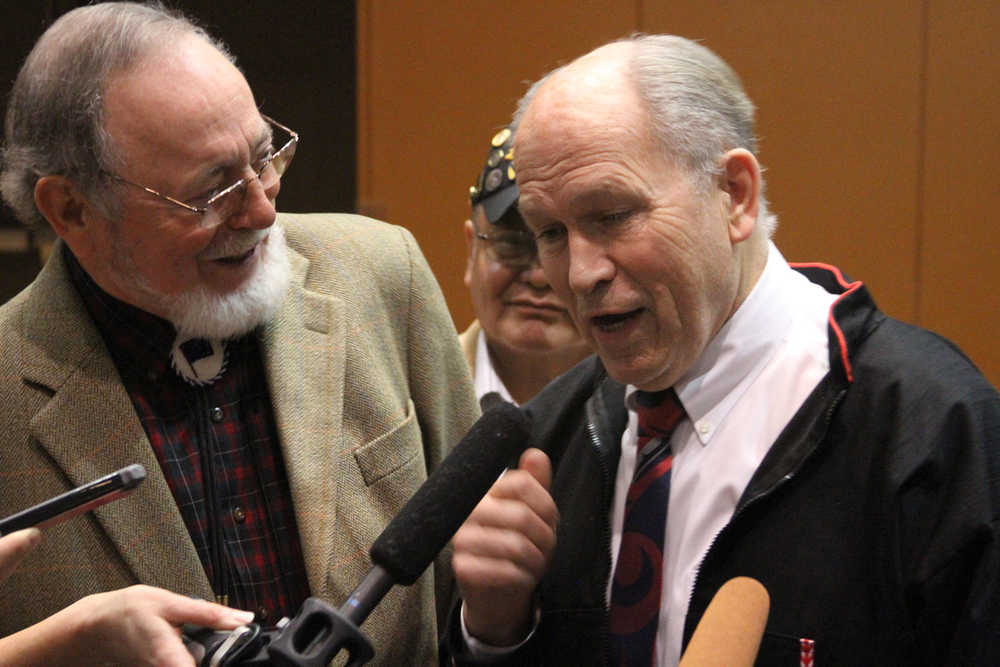ANCHORAGE — Three weeks after Royal Dutch Shell announced it was walking away from exploratory drilling in U.S. Arctic waters, the Obama administration has taken steps to keep drill rigs out of Alaska’s northern ocean for a decade or more.
Interior Secretary Sally Jewell announced Friday that the federal government is cancelling federal petroleum lease sales in U.S. Arctic waters that were scheduled for 2016 and 2017.
Jewell said the Chukchi Sea off Alaska’s northwest coast and the Beaufort Sea off the state’s north coast will not be included in the agency’s next five-year lease sale plan. Current leases held by Shell and other companies in Arctic waters will not be extended, she added.
The Beaufort Sea leases are set to expire in 2017, and the Chukchi Sea leases in 2020.
The decision reflects current market conditions and low industry interest, Jewell said in a news release.
“In light of Shell’s announcement, the amount of acreage already under lease and current market conditions, it does not make sense to prepare for lease sales in the Arctic in the next year and a half,” she said.
Shell was the only company actively exploring in U.S. Arctic waters, and it was in with both feet. The company estimates it has spent upward of $7 billion on Arctic offshore development, including $2.1 billion in one day for leases at a 2008 Chukchi Sea sale.
Shell hoped to tap into a resource the U.S. Geological survey estimates at more than 26 billion barrels of conventionally recoverable oil under Arctic waters.
However, the company announced Sept. 28 that an exploratory well drilled this summer had been a bust. Shell found oil and gas but not in commercial quantities. Shell said it was stopping exploration “for the foreseeable future” because of the disappointing results and the uncertain federal regulatory environment.
Shell, however, had applied to extend leases in both the Chukchi and the Beaufort. Statoil, an oil and gas company based in Norway, requested an extension for Chukchi leases.
Shell spokesman Curtis Smith said the company disagrees with the agency’s decision not to extend current leases.
“When it comes to frontier exploration in Alaska, one size does not fit all,” Smith said by email. “We continue to believe the 10-year primary lease term needs to be extended.”
In denying the extension, the Bureau of Safety and Environmental Enforcement’s regional supervisor for field operations, Kevin Pendergast, said Shell had not met the criteria to extend its leases, including providing the agency with a work schedule on them. Shell could apply again, he said.
Environmental groups strongly oppose drilling. They say industrial activity will harm marine mammals already hurt by a loss of sea ice and a spill could not be cleaned in ice-choked Arctic waters. They also said burning Arctic Ocean oil would accelerate global warming.
“This is great for the Arctic and its polar bears,” said Miyoko Sakashita of the Center for Biological Diversity. “We need to keep all the Arctic oil in the ground.”
“Secretary Jewell’s decisions today are consistent with the law as well as economic and environmental realities,” said Mike LeVine of oceans advocate Oceana.
As much as 90 percent of Alaska state revenue is generated by the petroleum industry. The state faces a deficit in the billions between projected spending and revenue because of low oil prices.
Gov. Bill Walker, an independent, personally lobbied Jewell to extend Shell’s leases. His goal is to get more oil in the trans-Alaska pipeline, which is running at about a quarter of its capacity. Walker said the Interior Department’s decision left him with a “loss of hope, in some respects” about accomplishing that.
Sen. Dan Sullivan, R-Alaska, said the Obama administration just robbed Alaskans of a lot of economic hope, at a time when the administration has vowed to help the state fight high rates of suicide, domestic violence and addiction.
“They just took real opportunity, significant opportunities that could benefit thousands if not tens of thousands of Alaskans off the table,” Sullivan said. “That’s not going to help the social problems. That’s actually going to make them worse.”
Rep. Don Young, who is the longest-serving Republican in the U.S. House, said the battle will likely end up in court.
“I think this administration is adamantly opposed against fossil fuels, period,” said Young, Alaska’s sole representative in the House. “They’ll do anything to stop it. I don’t think they have a legal leg to stand on.”
But Democratic Sen. Jeff Merkley of Oregon said the decision was a victory for the millions of Americans who raised their voices against Arctic offshore drilling.
“The simple fact is that drilling in the Arctic is the height of irresponsibility,” he said.
___
Associated Press writer Mark Thiessen in Anchorage contributed to this report.

